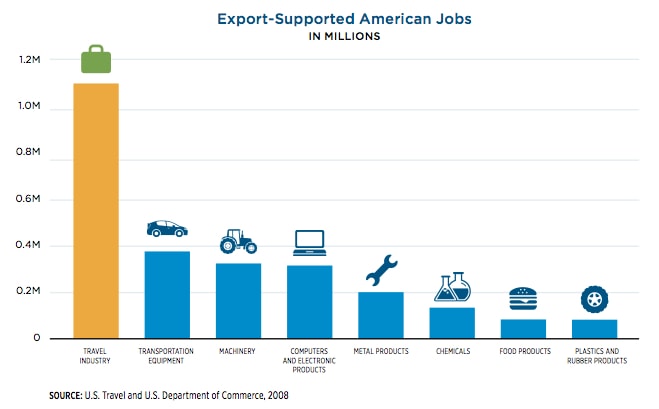The U.S. Travel Association released on 26 August 2012 some data you can use to make a case for taking better care of special places: the number of jobs generated by travel and tourism. USTA is an advocacy organization, so these numbers may suffer from a promotional puff-factor, but even at half strength they would be striking.

The report, Travel_Means_Jobs-USTA2012, offers a powerful argument for promoting tourism, especially overseas tourism. And that in turn provides an argument for good destination stewardship.
The report claims travel and tourism in 2011 supported 7.5 million U.S. jobs, which amounts to about 7% of private sector employment nationwide. It says travel job growth is outpacing the rest of the economy by 29%.
Significantly, small businesses provide the majority, 53%, of those travel jobs. “Small businesses in the travel industry employ a higher percentage of workers than the rest of the private sector in 44 of the 50 states,” according to the report. Plus, for all of us tourists, small businesses help make travel interesting.
What’s important about tourists from abroad? Incoming tourism actually constitutes an export, in that foreign money is buying U.S. services and products. (Tourism and real estate are among the few industries where the consumer goes to the product, not vice versa.)
That’s good for the U.S. economy, spreading incoming revenue and resulting jobs around the country. What’s more, tourists from abroad generally spend more per capita than domestic tourists, so you get more bang for each tourist footprint. (Similarly, Americans tend to spend more when they go abroad.)
Says the report, “Since 2008, travel has ranked as America’s largest export industry, ahead of other major exports such as machinery, chemicals, business services and agriculture. In 2011, it accounted for $153 billion in exports, which represented 7.3 percent of total U.S. exports in goods and services.”
The power of foreign tourism can be good for protection of destination assets—all those things that make each place special—because conservation measures can be shown to create jobs. Foreign tourism is also good “public diplomacy”: Visitors get to know Americans and dispel misconceptions about the country and its people.
Additionally, there is significance for the poorly promoted U.S. World Heritage program, because World Heritage is an attractor for foreign visitors. The 22 American sites inscribed under the World Heritage Convention—from the Great Smokies to Taos Pueblo—would do well to make their status better known.
—Jonathan Tourtellot
